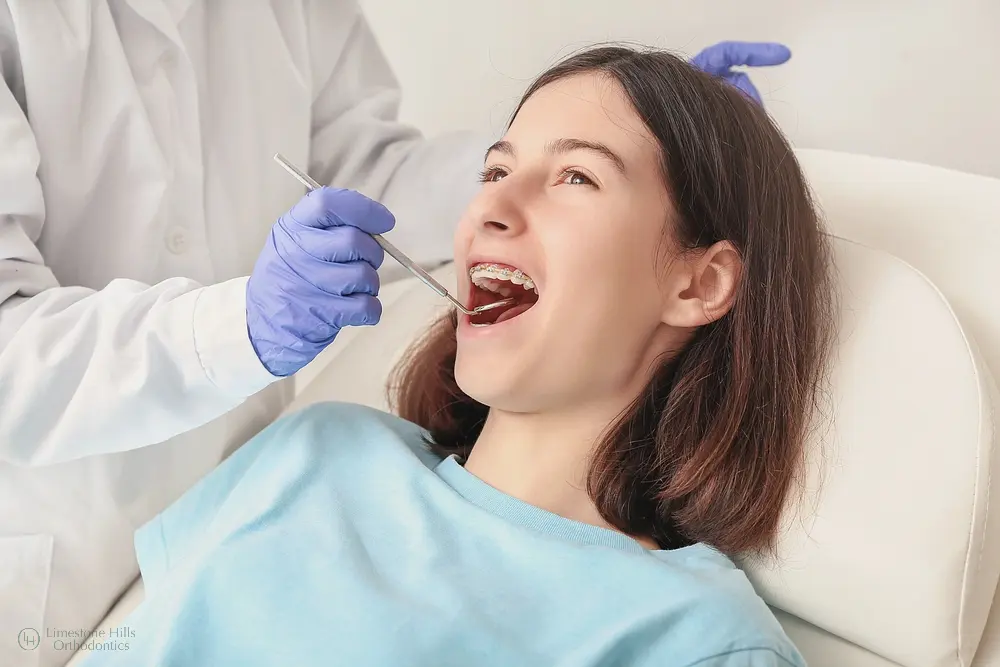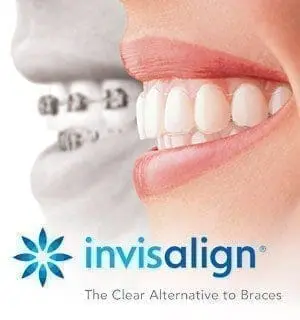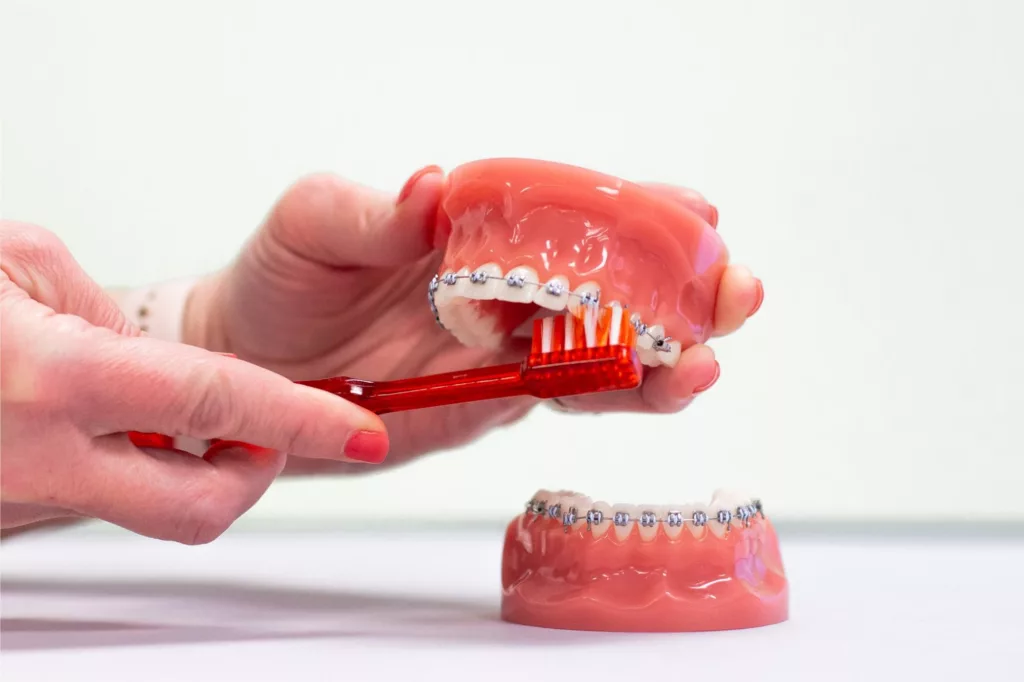If you’re wondering how to fix overbite in Austin, TX, the first step is to visit a local orthodontist. They can offer treatments like braces or Invisalign, which are great options for fixing overbites. Austin has many skilled experts who can walk you through the process and help you choose what’s right for you. It’s also a good idea to read reviews or ask friends and family for recommendations so you can find an orthodontist you trust.

Understanding Overbite
What Is an Overbite?
An overbite is when your top front teeth overlap your bottom front teeth. Some overlap is normal, but too much can cause problems. Overbites are measured by how much your top teeth stick out over your bottom teeth.
Types of Overbite
There are two main types of overbites:
- Skeletal Overbite: Caused by the shape or position of your jaw.
- Dental Overbite: Caused by the positioning of your teeth.
Both types can be treated with orthodontics, but the specific option depends on the underlying issue.
Why Do Overbites Happen?
Some people are born with an overbite due to genetics or jaw development. For others, habits during childhood can lead to overbites. Common causes include:
- Thumb sucking
- Prolonged use of pacifiers
- Teeth grinding or clenching
- Losing baby teeth too early or retaining them too long
Understanding the cause can help determine the right treatment.
How Does an Overbite Affect You?
An untreated overbite can lead to:
- Oral health issues: It may increase the risk of cavities, gum disease, and enamel wear.
- Jaw pain: Overbites can strain your jaw and even cause discomfort.
- Speech problems: Severe cases may affect speech clarity.
- Aesthetic concerns: Many people feel self-conscious about the appearance of their teeth.
Correcting an overbite improves both health and confidence.
Evaluation and Diagnosis
The First Step: Consultation
At your initial consultation, the orthodontist will examine your teeth. They will check your bite and ask about any discomfort you are experiencing.
The Role of X-rays and Imaging
Images and X-rays are essential for understanding your overbite. They help the orthodontist see the position of your teeth and jawbone. This allows for an accurate diagnosis and treatment plan.
Creating a Treatment Plan
After evaluation, the orthodontist will design a plan tailored to your needs. This plan will consider the severity of your overbite, your age, and your dental health.
How to Fix Overbite in Austin: Treatment Options
Braces: A Common Solution
Braces are still one of the best ways to fix an overbite. They use brackets and wires to gently move teeth into the right position. Modern braces are smaller and more comfortable than traditional ones. Ceramic braces are also available for a more subtle look. According to Dr. Cara Conroy Piskai, an expert orthodontist in Voorhees, NJ, braces are one of the most reliable solutions for correcting overbites, offering predictable and efficient results for patients of all ages.

Invisalign and Clear Aligners
For people who want a less noticeable option, Invisalign or clear aligners are a great choice. They are removable and custom-made to fit your teeth. Invisalign is effective for mild to moderate overbites. Benefits include:
- Discreet aligners that are almost invisible.
- No food restrictions since they are removable.
- Easier brushing and flossing.

Bite Correctors and Appliances
Dental appliances like bite correctors may be used alongside braces. These devices reposition the jaw to correct an overbite. They are often used for growing children, but they can also work for some adults.
Jaw Surgery: A Last Resort
In severe cases, jaw surgery may be necessary. This is often recommended for adults with skeletal overbites that braces alone cannot fix. Surgery repositions the jaw to improve alignment.
Orthodontic Treatment Process
Step-by-Step: How Treatment Works
The orthodontic process involves:
- Consultation: Identifying the issue and discussing options.
- Starting Treatment: Fitting braces, aligners, or appliances.
- Adjustments: Making regular adjustments to ensure progress.
- Completion: Removing braces or aligners once the teeth are properly aligned.
Monitoring and Technology
Modern orthodontics uses advanced technology. Tools like digital scans and 3D imaging make treatment more precise and faster.
Post-Treatment Care and Retention
Retainers: Keeping Your Smile Straight
After treatment, retainers are crucial. They keep your teeth from shifting back into their old positions. You’ll need to wear them as directed by your orthodontist.
Oral Hygiene Tips
Oral hygiene is vital during and after treatment. Remember to:
- Brush and floss daily.
- Clean removable aligners properly.
- Follow all care instructions from your orthodontist.
Protecting Your Results
Regular dental check-ups and good oral hygiene will help maintain your new smile. Avoid habits like teeth grinding, and wear your retainer as recommended.
Cost and Financing Options
How Much Does It Cost?
The cost of overbite treatment depends on the type of solution you choose. On average:
- Braces can cost between $3,000 and $7,000.
- Invisalign can cost around $4,000 to $8,000.
Payment Plans in Austin, TX
At Limestone Hills Orthodontics, we offer flexible financing. Payment plans and insurance options make treatment affordable for families. Be sure to ask about financing during your consultation.
Choosing the Right Orthodontist in Austin
Your orthodontist plays a key role in your care. When selecting an orthodontist, consider the following:
- Experience and expertise: Look for providers who specialize in overbite treatment.
- Patient reviews: Check testimonials to learn about the experiences of other patients.
- Convenience: Choose a local provider, like Limestone Hills Orthodontics, to ensure easy access to care.
Scheduling a consultation is the first step toward a healthy, confident smile.
About the Authors
Dr. Cara Conroy Piskai – Orthodontist in Voorhees, NJ
Dr. Rodrigo Viecilli – Orthodontist in Austin, TX
Frequently Asked Questions
Can you completely fix an overbite?
Whether it’s through braces, clear aligners, or even surgery in more severe cases, there are effective solutions available. It’s all about finding the right treatment that suits your needs. Your orthodontist will guide you through the options, and together, you can choose the best path to achieve that perfect smile.
How many years does it take to fix an overbite?
Fixing an overbite can take anywhere from a few months to a couple of years, depending on the severity of the case and the treatment method chosen. Generally, braces or aligners might be worn for about 1 to 3 years, while other treatments like surgery might have different timelines.
What is the best age to fix an overbite?
When it comes to fixing an overbite, the best age is usually during those early teen years, around 10 to 14 years old. This is because kids are still growing, and their jaws are more adaptable, making it easier for orthodontists to guide teeth into their proper positions. However, don’t worry if you’re older—it’s never too late to improve your smile!
How much does it cost to fix an overbite?
Fixing an overbite can vary in cost depending on a few factors like the severity of the overbite, the type of treatment you choose, and where you live. On average, you might be looking at anywhere from $3,000 to $8,000 for braces or Invisalign, while more complex cases that require surgery could range from $20,000 to $40,000.


